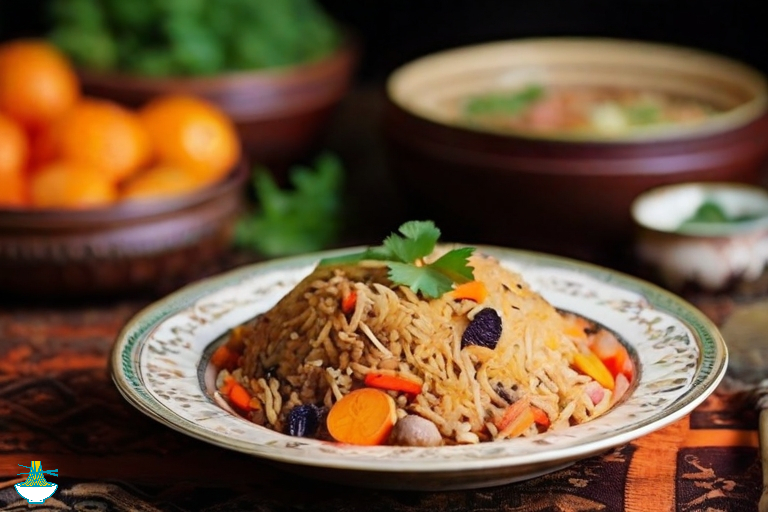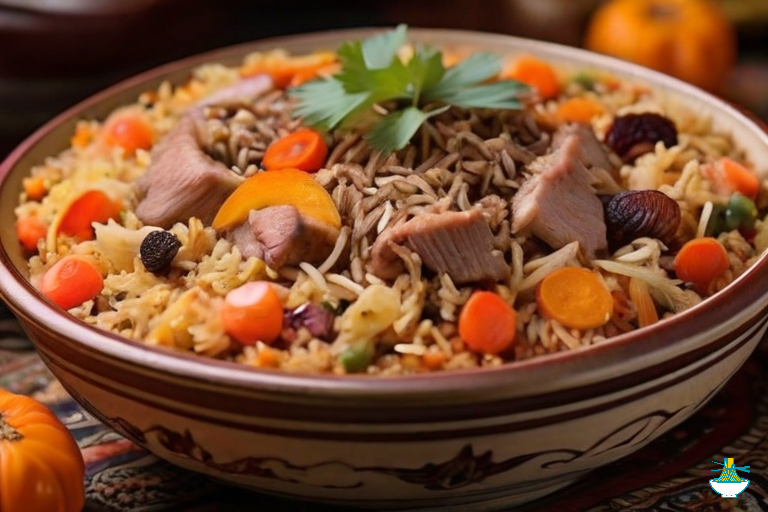Embark on a flavorful adventure through Azerbaijani cuisine as we delve into the exquisite world of Azerbaijani Plov, a traditional rice dish that has been cherished for generations. Hailing from the crossroads of Europe and Asia, Azerbaijan boasts a rich culinary heritage, and its Plov stands as a true testament to the nation's love for aromatic spices, tender meats, and perfectly cooked rice.
In this culinary exploration, we will guide you through the steps to create an authentic Azerbaijani Plov, revealing the secrets to achieving the perfect balance of textures and flavors. From the selection of the finest ingredients to the meticulous cooking process, get ready to transform your kitchen into a haven of Azerbaijani gastronomy
Join us as we unlock the essence of Azerbaijani Plov, where every grain of rice tells a story of tradition, celebration, and the warmth of Azerbaijani hospitality. Whether you're a seasoned chef or a kitchen novice, this recipe promises a delightful journey that transcends borders and brings the heart of Azerbaijan to your dining table.
Ingredients:
- 2 cups long-grain basmati rice
- 1 lb lamb or beef, cubed
- 1 large onion, finely chopped
- 2 medium carrots, julienned
- 1 cup vegetable oil
- 1/2 cup unsalted butter
- 4 cups hot water or broth
- 1 teaspoon cumin seeds
- 1 teaspoon coriander seeds
- 1 teaspoon whole black peppercorns
- 1-2 cinnamon sticks
- 4-5 cloves
- Salt to taste
- Fresh herbs (parsley, dill) for garnish

Instructions:
1-Rinse the rice under cold water until the water runs clear. Soak the rice in water for about 30 minutes, then drain.
2-In a large, heavy-bottomed pot, heat the vegetable oil and half of the butter over medium heat. Add the chopped onions and cook until they become translucent.
3-Add the cubed meat to the pot and brown it on all sides. This will enhance the flavor of the Plov.
Toss in the julienned carrots and continue cooking until they start to soften.
4-Add the soaked and drained rice to the pot, stirring gently to coat the rice with the flavors of the meat and vegetables.
5-In a mortar and pestle, crush the cumin seeds, coriander seeds, black peppercorns, and cloves. Add this spice mix to the pot, along with the cinnamon sticks. Mix well.
6-Pour the hot water or broth over the rice and meat. Season with salt to taste. Bring the mixture to a boil.
7-Once boiling, reduce the heat to low, cover the pot with a tight-fitting lid, and let it simmer for 20-25 minutes or until the rice is cooked and has absorbed the liquid.
8-While the Plov is simmering, melt the remaining butter in a separate pan until it turns a golden brown color. This will be used for drizzling over the cooked Plov.
9-Once the rice is cooked, fluff it gently with a fork to separate the grains. Remove the cinnamon sticks.
10-Transfer the Plov to a serving platter, and drizzle the browned butter over the top. Garnish with fresh herbs, such as parsley or dill.
11-Serve the Azerbaijani Plov hot, accompanied by yogurt or a side salad. Enjoy this aromatic and flavorful rice dish that captures the essence of Azerbaijani culinary traditions.
Nutritional Values:
It's challenging to provide precise nutritional values for a recipe without specific brands or exact measurements for some ingredients. However, I can offer approximate nutritional information based on standard values:
Long-grain basmati rice (2 cups):
- Calories: 360
- Carbohydrates: 80g
- Protein: 6g
- Fat: 1g
- Fiber: 2g
benefits:
- Good source of complex carbohydrates for energy.
- Contains some essential vitamins and minerals, such as B vitamins and manganese.
Lamb or beef, cubed (1 lb):
- Calories: 1200 (approx.)
- Protein: 80g (approx.)
- Fat: 96g (approx.)
benefits:
- Excellent source of high-quality protein, essential for muscle health.
- Rich in essential minerals like iron, zinc, and selenium.
Onion, large, finely chopped (1 onion):
- Calories: 60
- Carbohydrates: 14g
- Protein: 1g
- Fat: 0g
- Fiber: 3g
benefits:
- Contains antioxidants that may help protect cells from damage.
- Provides fiber for digestive health.
- May have anti-inflammatory and antimicrobial properties.
Carrots, medium, julienned (2 carrots):
- Calories: 100
- Carbohydrates: 24g
- Protein: 2g
- Fat: 0.5g
- Fiber: 6g
benefits:
- High in beta-carotene, which the body converts into vitamin A for eye health.
- Good source of fiber, promoting digestive health.
- Contains antioxidants that contribute to overall well-being.
Vegetable oil (1 cup):
- Calories: 1920
- Fat: 216g
benefits:
- Source of healthy fats, including monounsaturated and polyunsaturated fats.
- May help support heart health and reduce inflammation.
Unsalted butter (1/2 cup):
- Calories: 800
- Fat: 92g
benefits:
- Contains saturated fats but also provides fat-soluble vitamins like A, D, and E.
- Adds richness and flavor to the dish.
Hot water or broth (4 cups):
- Depending on the type and quantity of broth, the calories and nutrients can vary significantly. Broth is generally low in calories but can contribute to the overall sodium content.
benefits:
- Hydrates the body.
- Broth may contain nutrients extracted from meat and vegetables during cooking.
Cumin seeds (1 teaspoon):
- Calories: 8
- Carbohydrates: 1g
- Protein: 0g
- Fat: 0.5g
- Fiber: 0.5g
benefits:
- Contains antioxidants that may have anti-inflammatory effects.
- May aid in digestion and provide a distinct flavor to the dish.
Coriander seeds (1 teaspoon):
- Calories: 5
- Carbohydrates: 1g
- Protein: 0g
- Fat: 0g
- Fiber: 0g
benefits:
- Source of antioxidants that may have anti-inflammatory properties.
- Adds a warm, citrusy flavor to the dish.
Whole black peppercorns (1 teaspoon):
- Calories: 6
- Carbohydrates: 1g
- Protein: 0g
- Fat: 0g
- Fiber: 0g
benefits:
- Contains piperine, which may enhance nutrient absorption.
- May have antioxidant and anti-inflammatory properties.
Cinnamon sticks (1-2 sticks):
- Calories: 12 (approx.)
- Carbohydrates: 4g (approx.)
- Protein: 0g
- Fat: 0g
- Fiber: 3g (approx.)
benefits:
- Contains antioxidants with potential anti-inflammatory effects.
- May help regulate blood sugar levels.
Cloves (4-5 cloves):
- Calories: 10
- Carbohydrates: 3g
- Protein: 0g
- Fat: 0g
- Fiber: 1g
benefits:
- Rich in antioxidants, including eugenol, with potential anti-inflammatory effects.
- May contribute to oral healt
Salt (to taste):
- Sodium content will vary based on the amount added. It's essential to monitor sodium intake, especially if using broth with added salt.
benefits:
- Essential for maintaining electrolyte balance in the body.
- However, moderation is crucial to prevent excessive sodium intake.
Fresh herbs (parsley, dill) for garnish:
- Calories: Negligible
- Nutrients: Vitamins and minerals, including vitamin K, vitamin C, and potassium.
benefits:
- Rich in vitamins and minerals, including vitamin K and vitamin C.
- May have anti-inflammatory and digestive health benefits.
These values are approximate and can vary based on specific brands, preparation methods, and serving sizes. Always check the nutritional information on product labels for more accurate details.


Comments